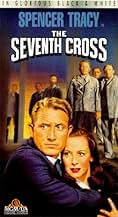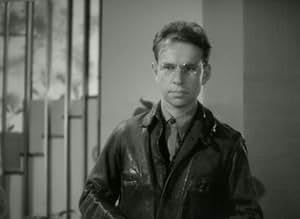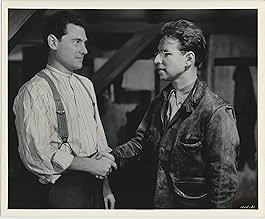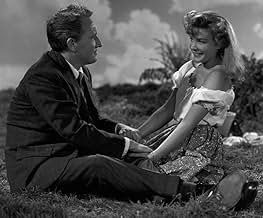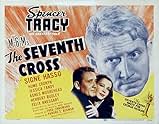NOTE IMDb
7,4/10
3,2 k
MA NOTE
Ajouter une intrigue dans votre langueSeven men escape from a Nazi prison camp. One makes it to freedom.Seven men escape from a Nazi prison camp. One makes it to freedom.Seven men escape from a Nazi prison camp. One makes it to freedom.
- Réalisation
- Scénario
- Casting principal
- Nommé pour 1 Oscar
- 3 victoires et 1 nomination au total
Avis à la une
While watching this film, I was under the impression that it had been made in the early 1950s and was amazed and impressed to see that it dates from 1944. Although not all the film's messages intertwine as neatly as they might, it is - overall - a great success. It seems surprisingly long for a film of its era as well, though it does not drag on the whole. Spencer Tracy gave me some clue in this role why he is considered to be such a great actor (you actually see his face change as he recovers from the near animal state the concentration camp had reduced him to) and Hume Cronyn and Jessica Tandy also put in top class performances. The depiction of the concentration camp is astoundingly vivid for the time, with the theme of seven crosses for either displaying the corpses of the escapees or for putting them to death being especially grim and - as the allies were soon to find out - no exaggeration as a symbol of the evil the Nazis visited upon millions who fell under their jackboot. Modern audiences may feel somewhat ambivalent about the idea of one of Tracy's dead friends from the camp acting as a voice within his soul, but I think even those not of a spiritual bent ought to concede it is depicted with a light touch that does not damage the film.
Seven prisoners escape from a German concentration camp, and the Nazi commander vows to capture and crucify all of them. One by one they are captured in some harrowing scenes and put up on the crosses outside the camp. The seventh cross, already placed, awaits the final escapee - played by a desperate Spencer Tracy. The fear and claustrophobia of being trapped, even as an escapee, inside Nazi Germany is easily seen through Tracy's able eyes. Most notable is the German couple that eventually aids Tracy despite their fear; they are played touchingly by the famous husband and wife team of Hume Cronyn and Jessica Tandy, two of the great actors of our age. Signe Hasso plays a lovely but lonely maid with whom Tracy and she have a touching emotional connection. The hope symbolized by the couple and the maid within the darkness of Nazi Germany is at the core of the film. The issue of Tracy's escape - or non-escape - is almost irrelevant by then: the glimmer of humanity is seen even among the German people. Despite the apparent pessimism of the film, it is optimistic at its heart. And it is charming and beautifully done. Not to be missed.
A truly outstanding film that has not received the distinction that it deserves, despite a first-rate cast and compelling, as well as unique for the time, subject matter.
Spencer Tracy plays George Heisler, one of seven prisoners escaping from a German concentration camp in 1936. The film traces his attempt to establish contact with the German resistance movement, and along the way he changes slowly from a hardened cynic, and regains his faith in mankind.
This is not a bang-bang action movie. The lack of overt violence is what makes gives the film a searing authenticity. This is based on a novel by Anna Seghers, whose husband was indeed imprisoned in a concentration camp. True, people knowledgeable about the era will find many technical errors. For one thing, all of the actors, including especially Tracy and Ray Collins, are simply too overfed to be believable concentration camp inmates. Also the film shows the SA running the camp, when I do believe the SS was running the camps by '36. I was not especially happy with the handling of the single Jewish character, who is a token character and not portrayed very favorably.
But this was 1944, not 1994, and this was the first film from Hollywood to depict concentration camps. Also I can't think of very many films that have more successfully captured the terror and despair of Nazi Germany, and also more clearly impart a moral message. In that regard it is very faithful to the book.
The performances by all, even the bit characters, are superlative. This was one of Spencer Tracy's finest roles, and supposedly the melancholy of his performance was to a large extent influenced by word that a young friend, who he knew from Boy's Town, had died in combat.
Cronyn and Tandy play Liesl and Paul Roeder, who try to help George Heisler. What makes this a very fine drama is how even secondary and bit characters are shown to change and evolve. Watch for Helene Weigel, wife of Bertold Brecht, playing an old female janitor watching Roeder being taken away in a car. Weigel was the inspiration for Brecht's Mother Courage.
Seghers was a Communist, as are the major characters of the book, and the politics of the author simmers below the surface without being explicitly expressed. Look closely at the characters playing Nazis and concentration camp guards, and generally most of the characters with accents. The majority are refugees from Nazi Germany, adding great authenticity to their performances.
Spencer Tracy plays George Heisler, one of seven prisoners escaping from a German concentration camp in 1936. The film traces his attempt to establish contact with the German resistance movement, and along the way he changes slowly from a hardened cynic, and regains his faith in mankind.
This is not a bang-bang action movie. The lack of overt violence is what makes gives the film a searing authenticity. This is based on a novel by Anna Seghers, whose husband was indeed imprisoned in a concentration camp. True, people knowledgeable about the era will find many technical errors. For one thing, all of the actors, including especially Tracy and Ray Collins, are simply too overfed to be believable concentration camp inmates. Also the film shows the SA running the camp, when I do believe the SS was running the camps by '36. I was not especially happy with the handling of the single Jewish character, who is a token character and not portrayed very favorably.
But this was 1944, not 1994, and this was the first film from Hollywood to depict concentration camps. Also I can't think of very many films that have more successfully captured the terror and despair of Nazi Germany, and also more clearly impart a moral message. In that regard it is very faithful to the book.
The performances by all, even the bit characters, are superlative. This was one of Spencer Tracy's finest roles, and supposedly the melancholy of his performance was to a large extent influenced by word that a young friend, who he knew from Boy's Town, had died in combat.
Cronyn and Tandy play Liesl and Paul Roeder, who try to help George Heisler. What makes this a very fine drama is how even secondary and bit characters are shown to change and evolve. Watch for Helene Weigel, wife of Bertold Brecht, playing an old female janitor watching Roeder being taken away in a car. Weigel was the inspiration for Brecht's Mother Courage.
Seghers was a Communist, as are the major characters of the book, and the politics of the author simmers below the surface without being explicitly expressed. Look closely at the characters playing Nazis and concentration camp guards, and generally most of the characters with accents. The majority are refugees from Nazi Germany, adding great authenticity to their performances.
This one caught me by surprise. It seemed rather formulaic at first, straightforward propaganda to inspire the people back home in the last years of WWII. But as it progressed it became much more, a portrait of German society on the eve of the aggression that started it all. Some elements tended to the melodramatic, especially the romance between Tracy and Hasso. I mean come on, they're confessing their love for each other after barely spending a few minutes together? Frankly Tracy has never been a favorite of mine in his earlier roles. He always tended toward the self-righteous, the arrogant, the visionary with no human frailties.
The narration from Ray Collins, the first escapee to be caught and killed was also on the corny side. Remember he was the first to die yet he's narrating much of the story. That may have worked in 1944 but today that's pretty dated. There are more effective ways to accomplish the same thing. Moreover the pathos in his voice was also a little over the top.
The standout performances here were from Hume Cronyn and Jessica Tandy as a couple from the working class who are enjoying the benefits of National Socialist largess. Their situation perfectly illustrated how the Nazi social programs kept the German workers happy with subsidies and tax advantages. I'm impressed that a film from 1944 dealt with that in an honest and straightforward manner. In my opinion the standout scene is when the Cronyn returns home after being questioned by the Gestapo and finds Tandy sitting at the table in their apartment. She looks up at him and the look on her face goes from surprise to amazement to joy and then she releases all her pent-up emotions and breaks down in uncontrollable sobs as Cronyn tries to comfort her. What a moving moment and what a treat!
The narration from Ray Collins, the first escapee to be caught and killed was also on the corny side. Remember he was the first to die yet he's narrating much of the story. That may have worked in 1944 but today that's pretty dated. There are more effective ways to accomplish the same thing. Moreover the pathos in his voice was also a little over the top.
The standout performances here were from Hume Cronyn and Jessica Tandy as a couple from the working class who are enjoying the benefits of National Socialist largess. Their situation perfectly illustrated how the Nazi social programs kept the German workers happy with subsidies and tax advantages. I'm impressed that a film from 1944 dealt with that in an honest and straightforward manner. In my opinion the standout scene is when the Cronyn returns home after being questioned by the Gestapo and finds Tandy sitting at the table in their apartment. She looks up at him and the look on her face goes from surprise to amazement to joy and then she releases all her pent-up emotions and breaks down in uncontrollable sobs as Cronyn tries to comfort her. What a moving moment and what a treat!
Although slow moving, as was typical of Hollywood dramas of that era, The Seventh Cross tells a compelling story of the human spirit overcoming the evils of totalitarianism, and the recovery of one's faith in mankind during the midst of a societal distrust. George Heisel, portrayed by Spencer Tracey (one of his classic performances), is a broken man who has lost his faith in humanity who has escaped from a Nazi concentration camp with six others in the early days of the Reich when not all Germans loved the Fuerer and still had decent intentions. The Nazi Commandant vows to capture all seven and hang them on crosses he has built inside the camp. Six are caught, but Heisel escapes to Mainz, leaving the seventh cross empty. In Mainz, he realizes that he can't go to his old girlfriend (who has married a Nazi) or his family (his younger brother has joined the SS); almost all his friends have turned Nazi or been captured or killed save one, Paul Roeder and his wife Liesel (played by longtime married actors Hume Cronyn and Jessica Tandy). The Roeder's help get him in touch with members of the underground (including Paul Guilfolye, father of the actor on CSI) who help him escape to Holland. As he leaves, he realizes he must pay back not those who hurt him and broke him, but those that healed him, those who restored his faith in the God-given decency inherent in all of us if given the chance to rise to the surface. Sometimes it can arise in the most unlikely of places, but it is there.
To be placed alongside The Hiding Place, Schindler's List and Swing Kids. A must see for anyone who loves freedom.
To be placed alongside The Hiding Place, Schindler's List and Swing Kids. A must see for anyone who loves freedom.
Le saviez-vous
- AnecdotesFirst joint film appearance of real life couple Hume Cronyn and Jessica Tandy.
- GaffesWhen the escapees are being hunted, the only uniformed personnel we see chasing them are the 'Storm troopers' (Sturmabteilung) or SA. Even before the 'night of the Long Knives', the SA would not have been the only group to search for escapees & by 1936, the hunt would also have been carried out by the regular police and the Schutzstaffel (SS).
- Citations
George Heisler: There are no better men than Paul Roeder.
- Versions alternativesThere is an Italian edition of this film on DVD, distributed by DNA srl, "LA SETTIMA CROCE (1944) + THE SEARCH (Odissea tragica, 1948)" (2 Films on a single DVD), re-edited with the contribution of film historian Riccardo Cusin. This version is also available for streaming on some platforms.
- ConnexionsFeatured in Twenty Years After (1944)
Meilleurs choix
Connectez-vous pour évaluer et suivre la liste de favoris afin de recevoir des recommandations personnalisées
- How long is The Seventh Cross?Alimenté par Alexa
Détails
Box-office
- Budget
- 1 300 000 $US (estimé)
- Durée1 heure 52 minutes
- Couleur
- Rapport de forme
- 1.37 : 1
Contribuer à cette page
Suggérer une modification ou ajouter du contenu manquant

Lacune principale
By what name was La septième croix (1944) officially released in India in English?
Répondre

